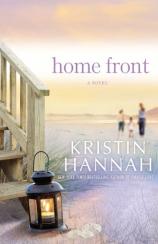Interview: February 2, 2012
HOME FRONT, Kristin Hannah’s new novel, tells the story of Jolene Zarkades, a woman who is deployed to Iraq and must leave her husband and two daughters behind. In this interview, conducted by Bookreporter.com’s Norah Piehl, Hannah discusses her inspiration for the book, as well as the extensive research process she took on to write it. She also describes her characterization methods, shares what she hopes readers will take away from the story, and previews her next novel.
Bookreporter.com: What inspired you to write HOME FRONT?
Kristin Hannah: Usually when I write a book, I can remember the exact moment the idea came to me. HOME FRONT is a little different in that way. I can't remember the second the light bulb came on. I think it was a gradual realization that came from watching the nightly news. As the war in Iraq went on, I watched the stories --- night after night --- of soldiers lost in battle, wounded, and the stories of their families left behind, waiting for them to return. As a mother, I was heartbroken for the men and women and their families. So many of the young soldiers on the news were the same age as my own son, and that hit me really hard. As an American, I was grateful, and as a woman, I began to wonder what it must be like to go off to war and leave your children behind. I can’t imagine anything that would be more terrifying and difficult. I realized that I had never read that story, and I wanted to. I wanted to explore the idea of a woman torn between love and honor. So I decided to write it.
BRC: Your choice to make the soldier of the family a woman was an unexpected and unusual one. Why did you decide to focus on a female soldier and a man on the home front?
KH: I decided to focus on a female soldier precisely because it was unexpected and unusual. We have all seen so many movies about wives at home while their husbands go off to war, but the opposite idea was fresh. More than that, it was timely and relevant. Women are being deployed in record numbers, and I wanted their story to be told.
BRC: Did you base the character of Jolene on any particular individual in real life? Do you have military members in your own family or group of friends?
KH: I didn't base Jolene on any one person, and no, I don't have any military members in my group of close friends. That's what made HOME FRONT such a challenge for me to write. It took a lot of research for me to really understand the whole military world. What surprised me the most was how deeply I was connected to the character of Jolene. I really loved writing her. She was a hero and yet she was flawed. I loved that combination.
BRC: I imagine that you had to do a substantial amount of research for this novel, on everything from post-traumatic stress disorder to military procedures. What kinds of research did you conduct?
KH: HOME FRONT was a research nightmare. I didn’t anticipate that to be the case, either. I was actually fairly cavalier about this particular aspect. I mean, I’m a lawyer, so research is something I’m comfortable with, and additionally, I have tackled breast cancer, brain tumors, the Siege of Leningrad and World War II Russia, and DNA-testing to exonerate convicted prisoners. I didn’t think that the themes and issues in this book would require any more research than I was used to. I couldn’t have been more wrong. Researching and writing HOME FRONT, with its military theme, was a mammoth undertaking. I was a bit like Alice, falling down the rabbit hole, into a world where nothing was quite the way I imagined it.
I think the depiction of PTSD is one of the most important and relevant portions of the book. I tried to really bring it home in a way that allowed readers to understand how it feels to suffer the symptoms. I also tried to inform readers, which was the point of the Keller trial. The reader learns the truth of PTSD along with Michael. Ultimately, one of the points of the novel is a reminder to all of us. As a nation, we have to care for our soldiers upon their return from duty. It’s just that simple.
BRC: We see that many factors of Jolene's life, from her decision to enter the military to her methods for coping with marital troubles, stem from her difficult childhood. Why did you include this history as a component of her already quite complicated character?
KH: Jolene's troubled background was there to bolster and clarify the choices she made in her adult life. I didn't want Jolene to be super-human or unbelievably heroic. I wanted her to be human and flawed and understandable. It is really her past that causes a lot of her troubles with Michael and her marriage. Also, it was important to me that the reader understand that the military became Jolene's first real family.
BRC: For much of the novel, Michael is a fairly unlikable character; at times, Jolene is also difficult to like. How did you meet the challenge of creating --- or sustaining --- sympathy toward these characters as you wrote?
KH: I have always tended to write characters who do unsympathetic things, although I try to make these choices understandable in the context of their lives. I think that's an important part of life. Characters need to be like the people we know --- complex and flawed and human. I'm not interested in people who always make the right decisions. I prefer people who are trying to do the right thing and failing. I like characters who are sometimes felled by circumstance and have to fight both their own instincts and outside forces to climb back up to their feet and keep fighting. These are the kind of people I want to read about and write about...the kind of people who deserve a happy ending. Jolene and Michael are definitely two people who make mistakes, sometimes terrible ones, and their journey in the novel is to battle through their pain and heartbreak to redefine their future.
BRC: In part, Michael's growing empathy toward his wife results from the PTSD case he's working on. Has the type of defense he's constructed ever been employed successfully?
KH: There have been several cases lately that employed PTSD as a diminished capacity defense. It is very rarely successful.
BRC: Many of your readers may not know anyone in the active military. What do you hope they will take away from your novel? How would you like it to be received by military families?
KH: I don’t come from a military family, nor do I know a lot of military families personally, so I would say that I was woefully uninformed about all of it. Prior to HOME FRONT, I would have said that I understood something about their lives and their service, but I was wrong in almost everything. I only understood the thinnest layer. I learned so much in the writing of this novel and in researching it. I went to a deployment ceremony and honestly, I think every American should attend one. Watching our soldiers preparing to go off to war, and their families standing alongside to say goodbye, really brings their sacrifice into sharp focus. It is a powerful reminder that whatever one feels about any particular war, we need to always respect and honor our soldiers and their families. Honestly, I felt a little ashamed that I hadn’t attended one before. Although, boy, was it difficult. I was humbled by their pride and strength in the face of such an undertaking. It makes you truly consider what heroism is and reminds you to be grateful.
BRC: You address some pretty dark issues in HOME FRONT. Emotionally, was this a tough book for you to write?
KH: Yes, very much so. There were two difficulties that this book presented. First was the burden of authenticity. It was important for me to capture the spirit of the true American soldier in my portrayal of Jolene and Tami and their colleagues. Because I knew so little about the military when I began, creating these characters, and indeed the world they inhabit, was often an uphill battle. And then, as the writing continued, I fell so in love with Jolene --- she has become my favorite character of all time --- that I really wanted not to “ruin” her by doing anything wrong. Second, I was fairly undone by the emotional component of this novel, and honestly, even though I have often written about difficult, heartrending situations, no story has ever affected me personally so deeply. No novel of my own has ever so consistently brought me to tears. It was difficult to maintain my balance as a writer in this one.
BRC: You always explore complex relationships --- and often take on big ideas --- in your books. What can readers look forward to next?
KH: Right now I'm deep in the process of writing the first draft of a new novel. For me, that's the time when everything is up in the air --- characters, plot point, setting, back stories. I have the book's theme and the main issues that I want to explore, but that's about it. It's shaping up to be a story-within-a-story novel, which is one of my favorite fictioinal structures. I'm experimenting with both tense and point of view at the moment, but I have no idea what will remain in the next draft. I've already thrown away two previous drafts. I wish I could give you a lovely little wrap up sentence that distilled my current idea into a single, compelling story. Boy, do I wish I could. I can only tell you that I'm writing about a cast of really interesting characters doing unexpected things....that's what I've got for now.




